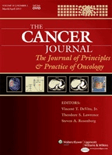
CANCER JOURNAL
Scope & Guideline
Empowering Researchers to Combat Cancer Challenges.
Introduction
Aims and Scopes
- Hematological Malignancies:
The journal primarily focuses on various types of blood cancers, including but not limited to acute myeloid leukemia (AML), multiple myeloma, and lymphomas, providing insights into their biology, clinical features, and treatment strategies. - Genomic and Molecular Insights:
A significant emphasis is placed on the genomic and molecular underpinnings of hematological malignancies, exploring mutations, rearrangements, and genetic predispositions that impact disease prognosis and treatment response. - Clinical Trials and Therapeutics:
The journal features studies on clinical trials, evaluating new therapeutic agents and treatment regimens, including CAR-T cell therapies, bispecific antibodies, and combination therapies to enhance patient outcomes. - Real-World Evidence and Patient Outcomes:
Research examining real-world data, treatment patterns, and long-term outcomes in patients with hematological malignancies is a core area of focus, providing insights into the effectiveness of therapies in diverse populations. - Disparities in Care:
The journal addresses disparities in access to treatment and outcomes based on race, socioeconomic status, and other demographic factors, highlighting the need for equitable healthcare in oncology.
Trending and Emerging
- Immunotherapy and CAR-T Cell Therapies:
There is a significant increase in research focusing on immunotherapeutic approaches, particularly CAR-T cell therapies, which are showing promise in treating various hematological malignancies, including relapsed/refractory cases. - Multi-Omics Approaches:
Emerging studies employing multi-omics techniques are gaining popularity, enabling a more comprehensive understanding of the molecular landscape of blood cancers, which can inform personalized treatment strategies. - Minimal Residual Disease (MRD) Monitoring:
The importance of MRD monitoring is increasingly recognized, with research focusing on its prognostic value and implications for treatment decisions, particularly in AML and multiple myeloma. - Real-World Evidence and Patient-Centric Research:
There is a growing trend towards utilizing real-world data to assess treatment efficacy, patient outcomes, and healthcare disparities, emphasizing the need for evidence that reflects everyday clinical practice. - Genetic and Epigenetic Modifications:
Research into the genetic and epigenetic alterations associated with hematological malignancies is on the rise, providing insights into disease mechanisms and potential therapeutic targets.
Declining or Waning
- Traditional Chemotherapy Approaches:
There is a noticeable decline in studies focusing solely on traditional chemotherapy regimens, as the field increasingly shifts towards targeted therapies and immunotherapies that offer improved efficacy and reduced toxicity. - Single-Agent Studies:
Research centered on single-agent therapies is becoming less common, with a growing trend towards combination therapies that leverage synergistic effects to enhance treatment outcomes. - Basic Science Research:
While foundational research remains important, there appears to be a reduction in publications emphasizing basic science without direct clinical implications, as the journal prioritizes translational and clinical studies that impact patient care.
Similar Journals
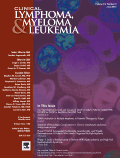
Clinical Lymphoma Myeloma & Leukemia
Exploring Innovations in Blood Cancer TreatmentClinical Lymphoma Myeloma & Leukemia is a prestigious journal dedicated to the study and treatment of hematologic malignancies, offering a vital platform for researchers and healthcare professionals in the fields of oncology, hematology, and cancer research. Published by CIG MEDIA GROUP, LP, this journal has established itself as a crucial resource since its inception in 2010, with a continuous commitment to disseminating knowledge until at least 2024. With an impact factor that objectively reflects its influence, it is rated in Q3 quartiles in both Cancer Research and Hematology as well as in Oncology as of 2023. Researchers can access a wealth of articles and studies that explore various dimensions of lymphoma, myeloma, and leukemia, thus fostering an environment of collaboration and innovation. Although it currently does not offer full open access, its extensive archive and rigorous peer-review process ensure the publication of high-quality research, making it an essential resource for anyone dedicated to advancing the science and practice of treating blood cancers.
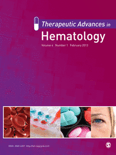
Therapeutic Advances in Hematology
Fostering collaboration for a healthier tomorrow.Therapeutic Advances in Hematology is a prestigious, peer-reviewed journal dedicated to advancing the field of hematology through innovative research and clinical studies. Published by SAGE Publications Ltd, this journal has become a vital resource for hematology professionals and researchers since its inception in 2010. With its impactful Q1 ranking in Hematology and a Scopus rank of 62 out of 137, it firmly establishes itself as a leader in disseminating significant findings and therapeutic approaches. The journal has been committed to open access since 2019, ensuring that its cutting-edge research is readily available to the global scientific community. Covering a broad scope of topics within hematology, Therapeutic Advances in Hematology is an essential platform for those seeking to enhance their understanding and implementation of therapeutic practices in hematological conditions. The journal embraces submissions from both clinical and laboratory perspectives, fostering collaboration and dialogue among researchers, clinicians, and students alike.

Targeted Oncology
Advancing cancer care through targeted research.Targeted Oncology is a premier, peer-reviewed journal published by SPRINGER, focusing on the latest advancements in the field of oncology, specifically targeting the development and application of targeted therapies. Since its inception in 2006, this journal has become an essential resource for researchers, healthcare professionals, and students, providing critical insights into innovative cancer treatments and the pharmacological landscape. Recognized for its impactful contributions, Targeted Oncology holds a distinguished Q1 ranking in both Oncology and Pharmacology categories as of 2023, underscoring its influence and relevance in the scientific community. With an impressive Scopus ranking reflecting its strong citation impact, the journal not only disseminates high-quality research but also facilitates knowledge exchange among oncologists and researchers working towards improving patient outcomes. Although not an Open Access journal, Targeted Oncology is committed to advancing cancer research and therapeutic strategies, making it an invaluable addition to the libraries of any institution dedicated to health and wellness.
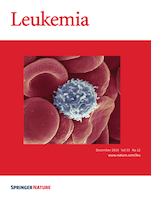
LEUKEMIA
Championing Excellence in Cancer ResearchLEUKEMIA, published by SpringerNature, is a premier journal in the field of hematology and oncology, with ISSN 0887-6924 and E-ISSN 1476-5551. Established in 1987, this esteemed publication serves as a critical platform for disseminating groundbreaking research and comprehensive reviews on the pathophysiology, diagnosis, and treatment of leukemia and related hematological disorders. With a distinguished impact, it holds a top-tier status in several categories, including Q1 rankings in Anesthesiology and Pain Medicine, Cancer Research, Hematology, and Oncology for 2023. The journal is globally recognized for its rigorous peer-review process and is highly regarded among academia, evidenced by its impressive Scopus rankings—7th in Hematology and 24th in Oncology. Researchers, clinicians, and students alike will benefit from the rich content that this journal offers, making it an invaluable resource in the fight against leukemia. The main objective of LEUKEMIA is to advance knowledge and encourage further innovations within the field, ensuring that vital insights reach practitioners and researchers around the world.

Translational Oncology
Advancing Cancer Research from Lab to LifeTranslational Oncology is a premier open access journal published by Elsevier Science Inc, dedicated to the rapidly evolving field of cancer research and oncology. Since its inception in 2008, the journal has been a vital platform for the dissemination of innovative research and findings that bridge the gap between laboratory discoveries and clinical applications. With an impressive impact factor and ranked Q2 in Cancer Research and Q1 in Oncology, it occupies a prominent position in the academic landscape, helping to shape the future of cancer therapeutics and patient care. The journal offers valuable insights across a diverse array of topics, including molecular biology, genetic factors in cancer, and innovative treatment strategies, ensuring relevance and engagement for its readership. As it converges toward 2024, Translational Oncology continues to attract a global audience of researchers, healthcare professionals, and students committed to advancing our understanding of cancer and enhancing clinical outcomes.

Journal of Hematology
Pioneering Discoveries in Blood HealthThe Journal of Hematology, published by ELMER PRESS INC, serves as a pivotal platform for disseminating cutting-edge research in the field of hematology. With an ISSN of 1927-1212 and an E-ISSN of 1927-1220, this journal is committed to advancing scientific knowledge and clinical practice through high-quality peer-reviewed articles encompassing all aspects of blood disorders, from basic science to health policy implications. While the journal currently operates under a traditional access model, it nonetheless prioritizes the rapid publication of significant findings, ensuring that researchers, clinicians, and students have timely access to the latest advancements in hematological research. Positioned to bridge gaps in knowledge and foster collaboration among scholars worldwide, the Journal of Hematology is an essential resource for anyone invested in this vital area of medicine.

CANCER IMMUNOLOGY IMMUNOTHERAPY
Unraveling the Complexities of Immunology and OncologyCancer Immunology Immunotherapy, published by Springer, stands as a premier journal in the fields of cancer research and immunology, holding a prestigious Q1 ranking across multiple categories, including Oncology and Medicine as of 2023. With an ISSN of 0340-7004 and an E-ISSN of 1432-0851, this journal has been a pivotal platform for groundbreaking research since its inception in 1976, continuing to provide insight into the complex interactions between the immune system and cancer. The journal's scope encompasses a wide array of topics, including novel therapeutic strategies, immunological mechanisms, and translational science aimed at advancing treatment outcomes for cancer patients. Renowned for its rigorous peer-review process and high impact factor, it attracts contributions from leading experts and researchers around the globe, positioning itself among the top-tier publications with Scopus rankings that reflect its vital role in advancing the field. Access options are generally subscription-based, ensuring a comprehensive resource for professionals and academics seeking to deepen their understanding and make meaningful contributions to cancer immunotherapy.

BLOOD REVIEWS
Fostering innovation in the science of blood.BLOOD REVIEWS is a highly regarded journal published by Churchill Livingstone, specializing in the fields of Hematology and Oncology. With an impressive Q1 ranking in both disciplines and placing in the top 10% of its peer categories according to Scopus metrics, it provides an essential platform for the dissemination of cutting-edge research and reviews pertaining to blood disorders and cancer treatment. Since its inception in 1987 and continuing through 2024, the journal has established itself as a cornerstone for healthcare professionals, researchers, and students who seek to advance their understanding of hematologic and oncologic topics. While not an open-access journal, BLOOD REVIEWS retains a reputation for delivering high-quality, peer-reviewed articles that foster dialogue and innovation within the scientific community. For those in the United States and beyond, the journal serves as a vital resource, housed at the Journal Production Department in Edinburgh, Scotland, ensuring accessibility and a global reach in its critical academic contributions.

World Journal of Clinical Oncology
Advancing the Future of Oncology ResearchWorld Journal of Clinical Oncology, published by BAISHIDENG PUBLISHING GROUP INC, stands as a vital resource in the realm of oncology, providing a dedicated platform for the dissemination of cutting-edge research and clinical advancements. With an ISSN of 2218-4333, this journal facilitates a comprehensive exploration of modern oncology challenges and breakthroughs, targeting researchers, healthcare professionals, and students alike. Although it operates under the traditional subscription model, the impactful nature of its content is reflected in its notable ranking of 60 out of 334 in the category of Medicine _ Oncology, placing it in the 82nd percentile among peer publications. Covering significant topics in clinical oncology from 2014 to 2018, the journal has been instrumental in addressing evolving oncology practices and patient care innovations. By publishing high-quality studies, it remains an essential tool for advancing knowledge and fostering collaboration within the global oncology community.
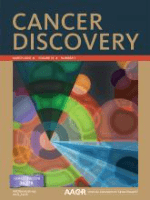
Cancer Discovery
Fostering Dialogue to Revolutionize Cancer ResearchCancer Discovery, published by the American Association for Cancer Research, stands as a vital resource in the oncological research community, renowned for its commitment to disseminating groundbreaking studies and innovative findings in cancer biology, prevention, diagnostics, and treatment. With a significant impact factor reflecting its esteemed position, this journal facilitates open discussions and collaborations, striving to bridge the gap between experimental and clinical research. The journal, which has been active since 2011, is classified as a Q1 publication in 2023, underscoring its influence and authority in the realm of Oncology. By providing a platform for rigorous peer-reviewed articles, Cancer Discovery aims to advance our understanding of cancer and enhance therapeutic strategies, making it an indispensable tool for researchers, professionals, and students eager to stay at the forefront of cancer research.